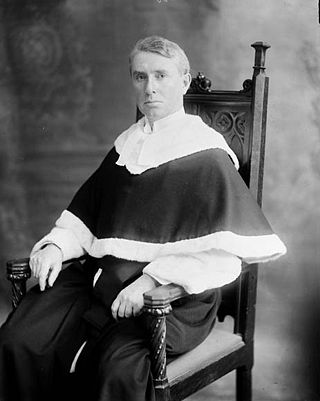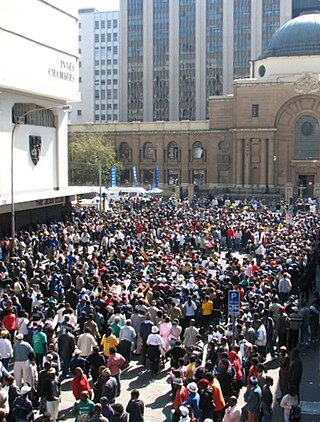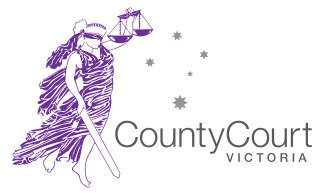The courts of England and Wales, supported administratively by His Majesty's Courts and Tribunals Service, are the civil and criminal courts responsible for the administration of justice in England and Wales.

The term magistrate is used in a variety of systems of governments and laws to refer to a civilian officer who administers the law. In ancient Rome, a magistratus was one of the highest ranking government officers, and possessed both judicial and executive powers. In other parts of the world, such as China, magistrate is a word applied to a person responsible for administration over a particular geographic area. Today, in some jurisdictions, a magistrate is a judicial officer who hears cases in a lower court, and typically deals with more minor or preliminary matters. In other jurisdictions, magistrates are typically trained volunteers appointed to deal with criminal and civil matters in their local areas.

District courts are a category of courts which exists in several nations, some call them "small case court" usually as the lowest level of the hierarchy. These include:

The High Court of South Africa is a superior court of law in South Africa. It is divided into nine provincial divisions, some of which sit in more than one location. Each High Court division has general jurisdiction over a defined geographical area in which it is situated. The decisions of a division are binding on magistrates' courts within its area of jurisdiction. The High Court has jurisdiction over all matters, but it usually only hears civil matters involving more than 400,000 rand, and serious criminal cases. It also hears any appeals or reviews from magistrates' courts and other lower courts.

The Judiciary of the Hong Kong Special Administrative Region is the judicial branch of the Hong Kong Special Administrative Region. Under the Basic Law of Hong Kong, it exercises the judicial power of the Region and is independent of the executive and legislative branches of the Government. The courts in Hong Kong hear and adjudicate all prosecutions and civil disputes, including all public and private law matters.

The courts of Scotland are responsible for administration of justice in Scotland, under statutory, common law and equitable provisions within Scots law. The courts are presided over by the judiciary of Scotland, who are the various judicial office holders responsible for issuing judgments, ensuring fair trials, and deciding on sentencing. The Court of Session is the supreme civil court of Scotland, subject to appeals to the Supreme Court of the United Kingdom, and the High Court of Justiciary is the supreme criminal court, which is only subject to the authority of the Supreme Court of the United Kingdom on devolution issues and human rights compatibility issues.

The Supreme Court of South Australia is the superior court of the Australian state of South Australia. The Supreme Court is the highest South Australian court in the Australian court hierarchy. It has unlimited jurisdiction within the state in civil matters, and hears the most serious criminal matters. The Court is composed of a Chief Justice and as many other judges as may be required.

In England and Wales, a magistrates' court is a lower court which hears matters relating to summary offences and some triable either-way matters. Some civil law issues are also decided here, notably family proceedings. In 2010, there were 320 magistrates' courts in England and Wales; by 2020, a decade later, 164 of those had closed. The jurisdiction of magistrates' courts and rules governing them are set out in the Magistrates' Courts Act 1980.

The County Court of Victoria is the intermediate court in the Australian state of Victoria. It is equivalent to district courts in the other states.

The High Court of Singapore is the lower division of the Supreme Court of Singapore, the upper division being the Court of Appeal. The High Court consists of the chief justice and the judges of the High Court. Judicial Commissioners are often appointed to assist with the Court's caseload. There are two specialist commercial courts, the Admiralty Court and the Intellectual Property Court, and a number of judges are designated to hear arbitration-related matters. In 2015, the Singapore International Commercial Court was established as part of the Supreme Court of Singapore, and is a division of the High Court. The other divisions of the high court are the General Division, the Appellate Division, and the Family Division. The seat of the High Court is the Supreme Court Building.

The Magistrates Court of South Australia is the lowest level court in the state of South Australia. The Magistrates Court, then known as the Court of Petty Sessions, was established in 1837, by the Court of Sessions Act 1837. It has both original and appellate jurisdiction and hears matters specified in the Magistrates Court Act 1991 (SA).
The Western Cape province of South Africa is governed in a parliamentary system in which the people elect the Provincial Parliament, and the parliament elects the Premier as head of the executive. The Premier leads a cabinet of provincial ministers overseeing various executive departments. The provincial government is subject to the Constitution of the Western Cape and the Constitution of South Africa, which together form the supreme law of the province.

The courts of South Africa are the civil and criminal courts responsible for the administration of justice in South Africa. They apply the law of South Africa and are established under the Constitution of South Africa or under Acts of the Parliament of South Africa.

The basis of the Bahamian Law and legal system lies within the English Common Law tradition. Justices of the Supreme Court, Registrars and Magistrates are all appointed by The Governor-General acting on the advice of the Judicial and Legal Service Commission, which is composed of five individuals who are headed by the Chief Justice as their chairman. The Chief Justice and the Justices of the Court of Appeal, including the President, are appointed by the Governor-General on the recommendation of the Prime Minister after consultation with the Leader of the Opposition. Once appointed, the salaries and other terms of appointment of the Chief Justice, Justices of Appeal and Justices of the Supreme Court cannot be altered to their disadvantage. Justices of the Supreme Court can serve until the age of 65 years and, where agreed among the judge, the Prime Minister and the Leader of the Opposition, may serve until the age of 67. Justices of Appeal can serve until the age of 68 years and, where agreed among the judge, the Prime Minister and the Leader of the Opposition, may serve until the age of 70 years. The law of The Bahamas makes provisions for the appointment of 12 Justices to the Bench of the Supreme Court, inclusive of the Chief Justice, and for five Justices of the Court of Appeal, inclusive of the President. The Chief Justice, as Head of the Judiciary, is an ex officio member of the Court of Appeal, but only sits at the invitation of the President.
The Northern Cape province of South Africa is governed in a parliamentary system in which the people elect the provincial legislature and the legislature, in turn, elects the Premier as head of the executive. The Premier leads an Executive Council consisting of members who oversee various executive departments. The structure of the provincial government is defined by chapter six of the Constitution of South Africa.
The Judiciary of Sri Lanka are the civil and criminal courts responsible for the administration of justice in Sri Lanka. The Constitution of Sri Lanka defines courts as independent institutions within the traditional framework of checks and balances. They apply Sri Lankan Law which is an amalgam of English common law, Roman-Dutch civil law and Customary Law; and are established under the Judicature Act No 02 of 1978 of the Parliament of Sri Lanka.

The Judiciary of Malawi is the branch of the Government of Malawi which interprets and applies the laws of Malawi to ensure equal justice under law and to provide a mechanism for dispute resolution. The legal system of Malawi is based on English law, modified since 1969. The Constitution defines the judiciary as a hierarchical system of courts, with the highest court being a Supreme Court of Appeal, together with a High Court and a number of magistrates' courts. Malawian judiciary has frequently demonstrated its independence in recent years. The constitutional court of Malawi nullified the 2019 election results, citing widespread irregularities. The Supreme court upheld the verdict of the constitutional court. Five Constitutional Court judges who overturned the results of the 2019 election have been nominated by the UK thinktank Chatham House for the 2020 Chatham House Prize. Ultimately the judges went onto win the prize.
The Eastern Cape province of South Africa is governed in a parliamentary system in which the people elect the provincial legislature and the legislature, in turn, elects the Premier as head of the executive. The Premier leads an Executive Council consisting of members who oversee various executive departments. The structure of the provincial government is defined by chapter six of the Constitution of South Africa.

The Royal Court is the principal and oldest court in Jersey, and exercises both criminal and civil jurisdiction. It can sit in a number of configurations, depending on the type of case and the powers to be exercised.
The North West of South Africa is governed in a parliamentary system in which the people elect the North West Provincial Legislature and the legislature elects the Premier as head of the executive. The Premier leads a cabinet of MECs overseeing various executive departments. The provincial government is subject to the Constitution of South Africa.
















